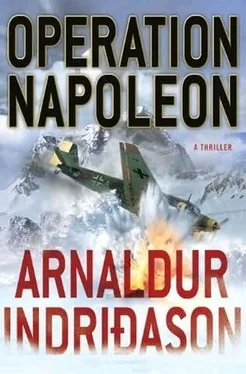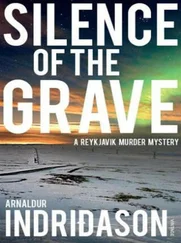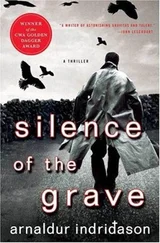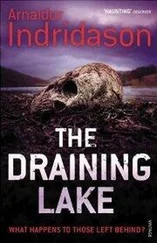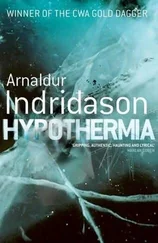He recalled what he had read in one of the briefing documents from the dossier in the plane, a yellowing typewritten sheet, with a British War Cabinet Office letterhead.
… following the meeting in Yalta that Stalin would have excessive power in Eastern Europe and would no doubt fail to keep the terms of the treaties. The British War Cabinet has therefore drafted a plan for an Allied attack on Stalin’s government in Moscow, which would result in the elimination of Russia. The plan has been assigned the codename ‘Operation Unthinkable’. The war in the European theatre will be brought to an end by means of a treaty with the Germans, according to the terms of which approximately one hundred thousand German soldiers will join the Allies in the attack on Stalin, to be deployed in the front line of the first wave of the invasion. It is considered advisable to launch the eastward attack from north Germany, near Dresden. A second attack, to be launched from the Baltic, cannot be ruled out. It is assumed that the Russians will respond by invading Turkey, Greece, and even Norway from the north. It is also likely that they will attempt to secure oil reserves in Iraq and Iran.
The idea is not a new one and has been debated in the innermost circles where it initially met with overwhelming opposition. Its fiercest opponents regard negotiation with Germany as tantamount to entering into an alliance with the Nazis, who initiated the war that has laid waste to Europe. Recent discoveries in Eastern Europe have also confirmed suspicions about the organised extermination of the Jews. Another credible argument against Unthinkable is that the Russians more than any other nation have changed the course of the war, helping to secure an Allied victory at enormous cost to themselves.
Notwithstanding, there are those who believe they can shorten the war by several months, thus minimising further loss of life. They are looking to the future and fear how the world will appear if Unthinkable is not put into action. There is serious concern about what will follow the end of the war when the Yalta Treaty authorises Stalin control over almost half of Europe as well as the Baltic States. It is already clear that he cannot be trusted to keep the terms of the treaty. His policy of expansionism, this thinking suggests, will threaten the newly won peace in future years. The Prime Minister has referred in private talks to an ‘iron curtain’…
Ratoff remembered something he had seen in the pilot’s diary. The writing was almost illegible towards the end until only fragments could be made out, only the odd sentence, of which Ratoff could make little. Disconnected snatches about his parents, his brother, death. He remembered one sentence in particular. I’m almost sure I saw Guderian at the meeting. Guderian, Hitler’s chief of staff towards the end of the war.
Ratoff started out of his reverie. The pilots had been trying to attract his attention over the radio and finally one of them shouted his name.
‘A message from the glacier, sir, from someone called Bateman,’ he said when Ratoff asked what was going on.
‘What message?’
‘He says she’s vanished, sir.’
‘Who?’
‘Some woman. He won’t say over the radio. Doesn’t trust us. The message is: she’s disappeared from the camp.’
He ordered them to put him through; his earpiece filled with crackling static and radio distortion as they searched for the correct channel, then he heard Bateman’s voice.
‘It’s incomprehensible, totally incomprehensible, sir,’ Ratoff heard him say.
‘Go after her,’ Ratoff shouted. ‘She must be moving away from the camp. She should show up on the radar.’
‘No, she isn’t. It’s as if she’s vanished into thin air. The surveillance system doesn’t show her anywhere near the camp and we’ve turned the whole place upside down but she’s nowhere to be found. Vanished into thin air. And we’re dismantling the system so we won’t be able to use it any more.’
A cold tremor of alarm went through Ratoff. He could not afford any more mistakes. They had fumbled their way through this operation and were on the point of getting out intact and now this infernal woman was once again jeopardising his success.
‘There’s another thing, sir,’ Bateman said. ‘We found a man in the tent in her place. He claims he’s the leader of the rescue team. His name’s Júlíus. He evaded our guards and it’s obvious that he must have helped her. What do you want us to do with him?’
‘Why wasn’t I told about this man?’ Ratoff snarled.
‘There wasn’t time, sir,’ Bateman answered.
Ratoff looked into the dark oblivion beyond the helicopter’s porthole.
‘He knows where she is. Get it out of him.’
‘There’s no time for that. We’re almost ready to move out. The first group will be setting off in a matter of minutes.’
The helicopter pilots were listening to the conversation with interest.
‘Take him with you,’ Ratoff ordered. ‘Take him with you and for Christ’s sake make sure he doesn’t escape.’ He would have to deal with him later.
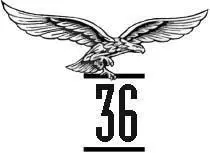
KEFLAVÍK AIRPORT,
SUNDAY 31 JANUARY
The helicopters took off ten minutes apart but the second made better progress and had narrowed the gap by the time they reached Keflavík Airport. They flew straight to the C-17 at the end of runway seven, where each half of the German aircraft was lowered on to a special pallet which was then rolled into the transport plane. There would be no other cargo on this trip. It took no more than half an hour to load the old Junkers into the hold where it was swallowed up by the cavernous interior.
Ratoff strode hurriedly down the runway towards the C-17. He knew Carr was waiting for him on board but no other passengers would be crossing the Atlantic with them. The Delta Force operators would report back to the base over the next fifteen hours, bringing their equipment and vehicles, and the C-17 would make a return journey to fetch them.
By the time Ratoff reached the C-17, the rear section of the German aircraft was in the process of being loaded. He followed in its wake up the ramp and into a hold half the size of a football pitch, lit by powerful strip-lights. The Junkers’ front section was already on board, looking tiny in the belly of the machine. Ratoff stopped to watch the manoeuvres, breathing in the stench of metal, oil and high-octane fuel.
‘Everything went according to plan, I hope,’ said a voice behind him. Turning, he came face to face with Carr. The general had aged since the last time they met, his ashen face was withered and his uniform hung loosely on his frame despite his imposing height. His eyes looked dull and weary behind his glasses and his shoulders sagged.
‘For the most part, sir,’ Ratoff replied.
‘For the most part?’ Carr queried.
‘That girl is unbelievable. She managed to escape from the camp after we caught her, but it’s irrelevant now. She won’t be able to expose this,’ Ratoff said, jerking his head in the direction of the Junkers.
‘Has she found anything out, do you know?’
Ratoff thought.
‘She’s gotten hold of the name Napoleon,’ he said eventually, ‘but I don’t think she knows its significance.’
‘But you do?’
‘Yes, sir.’ Ratoff’s gaze was steady.
‘You’ve read the documents.’
‘It couldn’t be avoided, as I believe you anticipated, sir.’
Carr ignored this.
‘Where on earth can she have heard the name linked to the plane?’
‘Maybe someone on the base told her their suspicions. I didn’t have time to interrogate her properly but I gather that she and her companion, Steve, had visited a retired pilot who fed them some half-baked gossip. When she mentioned Napoleon, it was a last-ditch attempt to play for time. I don’t believe she knows what the name in the documents signifies.’
Читать дальше
